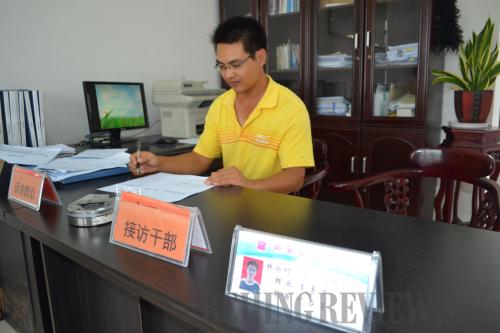|
 |
|
ON DUTY: A village leader on duty in the petition center of Lintou Village, Sidu Town of Zhaoan County in Fujian Province, on July 26 (LIU JIAN) |
In China's big cities, traditional funeral etiquette has been increasingly simplified, and people no longer follow many of the old funeral rituals. Yet in the country's vast rural areas, the funeral of a family member is still a huge event, with their offspring wanting to show their filial piety through their farewell to the deceased.
Before April 2013, residents in Lintou Village, Sidu Town of Zhaoan County in east China's Fujian Province were vexed by the absence of an appropriate place for such funerals. They thought that holding such a service in open space would be offensive to people living in the vicinity, as superstition says a funeral in front of their homes could bring bad luck.
"Funerals not only consume a large amount of manpower and material resources, but also trigger disputes between neighbors," villager Li Shundong told Beijing-based magazine ChinAfrica.
Near the Qingming Festival in 2013, or Tomb-Sweeping Day, Li and a few other villagers came to the village petition center to request the setting of such a place. Their request was recorded. Soon, they were invited to a village officials' meeting. Two weeks later, they got a reply from the village petition center. In the ensuing five months, abandoned old houses in the center of the village were torn down and replaced with two new houses, which were designated as venues for such farewell ceremonies.
The local officials' decision was applauded by the villagers, Li said. He said that since September 2013, more than 20 funerals had been held in the two facilities, with no disputes having since been reported.
Listening to the people
In an effort to improve local governments' management, officials in Zhaoan County are required to regularly meet with the people, listen to their opinions and solve their problems.
Nanzhao Town, the seat of Zhaoan County, is divided into 13 sub-districts and two villages and has a population of 71,000. According to Xu Shuyi, deputy town chief and director of the township petition center, township leaders take turns to receive petitions at the center.
"Now, the local people have more channels to voice their need," she said.
Designated staff members at the township petition center are expected to receive petitioners or their calls in a timely matter, patiently listen to their requests, and give a reply as soon as possible, Xu said. For matters beyond the purview of the township government, petitioners should be informed of the right procedures to follow. If a petitioner is not satisfied with the solution, he can petition again.
Standard procedure ensures effectiveness in petition handling, said Xu. In every stage of the petition handling process, certain persons and departments are held accountable, so as to ensure that problems reported by the public can be solved in a timely and effective fashion.
Xu said the county and township governments also hold regular meetings to study the petitions and seek solutions. This meeting is held by the county government at least once a month, by the township government at least once every two weeks, and by village leadership at least once every 10 days, she said.
| 